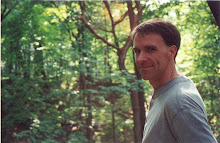Youngstown, Ohio: Pennsylvania Coal Town
I started in Youngstown at the museum in the former home of Wilford P. and Olive Arms called "Greystone." The name was appropriate, as soot from the city's factories had blackened the facade. The windows were sealed with thick plastic panels anchored into the stone walls. 
My eager young guide was named Brian. A tasteful blue-and-white tie hung against his white shirt above pleated dark blue slacks. Dainty silver glasses rested on the bridge of his nose. When I told him I was in a hurry and writing a book, he kindly gave me a speedy tour through the museum and the town history. This also might have explained his nervous, tight-throated tone, though he seemed by nature formal and high-strung.
"John Young was the founder," he explained. "He came from Connecticut. They had a big fire and needed to relocate people, so they claimed the whole Northwestern part of Ohio in five-mile squares. Though the town was named after him, his wife hated it here and quickly made them move back permanently to Connecticut. Daniel Sheehy (pronounced Shee-high) really settled the place. All land dealers had the bad habit of selling claims to two people. John Young did the same thing to Daniel Sheehy." He pointed to a framed piece of paper on the museum's wood cabin wall. "This is a bond against Daniel Sheehy for threatening John Young's life. They smoothed things out, and Daniel Sheehy even named one of his sons John Young Sheehy."
"Before settlers came," he continued, "nomadic tribes gathered salt here then left. Youngstown's in Mahoning County, and 'Mahoning' is believed to be a Native American word for 'salt bed.' The settlers discovered coal was pretty much everywhere in Youngstown. I think there were over 130 mines. Normally coal has to go through a coking process to be used as fuel, but Youngstown coal could come straight from the ground and be used as fuel. But Youngstown ran out of coal quite quickly. We dug ourselves dry."
His face cracked a sly smile, and his voice shifted higher with bemusement. "Now, the first immigrants of the area--English, German--they're good with the pick and shovel and whatnot, but they don't really know their minerals. They come across this stuff; they're not exactly sure what it is. They refer to it as 'bastard coal;' they kind of cast it aside. It's not until the Welsh come over, and they're sent down into the mines. They kind of looked at it and said, 'What are you doing?!' It was actually iron ore. There was also iron ore pretty much all around the area, and that's how we eventually became an iron-milling town. Because of the iron industry, the city grew nine times as large in the 1860s, quicker than it could handle.  This picture shows Youngstown in 1915. You can see how smoky it is. And you can see the mills going along the river for miles.
This picture shows Youngstown in 1915. You can see how smoky it is. And you can see the mills going along the river for miles.
"This washing machine manufactured in Youngstown was used for washing clothes, but you had to put them out to dry later. Because of how smoky it was, they'd get just as dirty again. Most vacuum cleaners, other than Bissell and Hoover, were made in Youngstown, like this one. You'd pull it back, it would pick up the dirt; you'd roll it forward, it would put the dirt back down." He turned to me and confided, "They went out of business."
"Here's  Power's Auditorium; the Warner Brothers built it. They were Youngstown natives. After World War II, people moved out into the suburbs. Also that's when factory closings start. The Bessemer process for making steel, which was modern at the time, was started in Youngstown. But they never, through the decades, changed. They never updated their machinery.
Power's Auditorium; the Warner Brothers built it. They were Youngstown natives. After World War II, people moved out into the suburbs. Also that's when factory closings start. The Bessemer process for making steel, which was modern at the time, was started in Youngstown. But they never, through the decades, changed. They never updated their machinery.
"The seventies, after the steel mills are closed, we went into a very large depression. The national government tried to help us out. They normally don't do things like that. The suburbs are flourishing, but the City of Youngstown itself... Right now the only offices downtown are governmental offices. Also  PharMor, which is another problem. PharMor would buy super cheap, and stuff it on their shelves. The problem was they were selling them a bit too cheap, and they weren't making very much money. They took the accounting numbers and kind of just," then he added (in a slower, higher-pitched voice) "changed 'em. So there was kind of an embezzlement issue there. A lot of people wonder where the money went. It actually went to the people, because the prices were so low."
PharMor, which is another problem. PharMor would buy super cheap, and stuff it on their shelves. The problem was they were selling them a bit too cheap, and they weren't making very much money. They took the accounting numbers and kind of just," then he added (in a slower, higher-pitched voice) "changed 'em. So there was kind of an embezzlement issue there. A lot of people wonder where the money went. It actually went to the people, because the prices were so low."
20090216
156 Youngstown, OH: Pennsylvania Coal Town
Subscribe to:
Post Comments (Atom)




No comments:
Post a Comment